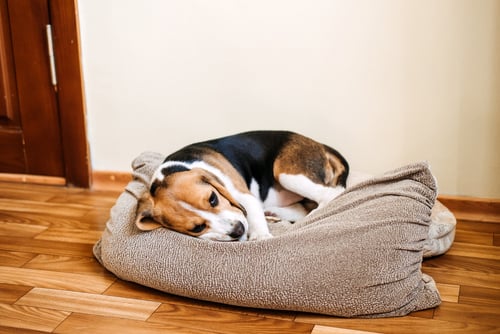- All products are added to your cart.
Fast delivery!
-
On weekdays, order before 14:00h and we will ship the same day!
-
Kwalitatief hoogwaardige producten.
-
Fair prices
-
Shipping to other countries depend on country
Giardia - diarrhea due to Giardia
Diarrhea as a result of (treatment against) Giardia in your dog or cat? Tips for the best aftercare after a Giardia infection
Every dog or cat can experience it; loose stools, or diarrhea. When your pet has diarrhea, it is not inherently alarming. Diarrhea is a way for the body to eliminate foreign substances due to, for example, a stomach virus or food poisoning. In many cases, it resolves on its own. However, intestinal parasites can also cause diarrhea. And these are not as rare as you might think. Giardia is one of the most common intestinal parasites in dogs and cats. Treatment against Giardia is possible, but a common problem is that after effectively treating Giardia, the symptoms persist. Good aftercare is crucial in such cases. But what is the best aftercare after treatment against Giardia?
What is Giardia?
Giardia is a common single-celled parasite that resides in the gastrointestinal tract of dogs and cats. Humans can also be carriers of this parasite. Giardia lives in the small intestine of its host, where it attaches to the intestinal mucosa. This attachment can damage the intestinal wall at the surface, disrupting the digestion and absorption of certain nutrients from its host. Additionally, Giardia's actions can inhibit the absorption of certain enzymes. When this disruption occurs, it can cause diarrhea.
Spread, infection, and symptoms
Spread from animal to animal occurs through contact with the feces of infected animals. Litter boxes and dog walking areas are common sources of Giardia infection. Dog and cat kennels/pensions also pose a significant risk of acquiring Giardia for your dog or cat. In these places, the infection pressure can sometimes rise to as much as 100%.
Giardia is ingested through the mouth and thus ends up in the small intestine. Here, Giardia cells attach to the intestinal wall. In the rear part of the intestine, the parasites encapsulate themselves in so-called cysts and are excreted with the feces. In this cyst stage, they are relatively insensitive to pesticides and can survive for months, making Giardia highly contagious and easily transmitted to other animals.
In many cases, infection (in healthy animals) does not or hardly causes symptoms, but these animals periodically shed infectious cysts. Especially in dogs with a weakened immune system (young and weakened animals, but also dogs with prolonged stress symptoms), disease symptoms occur. Prolonged and recurring diarrhea (meaning that diarrhea is present for several weeks to even months) is the main symptom of Giardia. Diarrhea due to Giardia is characteristic because it is often mushy and foul-smelling. It may contain mucus and blood. Often, dogs with Giardia are nauseous and easily vomit, but they often retain their appetite.
Detection and treatment
If you suspect that your dog or cat is infected with Giardia, it is recommended to consult your veterinarian. Your veterinarian will examine the stool of your dog/cat through microscopic analysis. However, because infected animals do not excrete the (cyst of the) parasite every day, it is challenging for the veterinarian to guarantee whether your animal is infected with Giardia. For immediate confirmation of whether your animal has Giardia or not, you can use a rapid test yourself. This rapid test detects Giardia antigens and is more sensitive and therefore more reliable because antigens are consistently present in the stool. However, multiple tests should be performed to confirm the presence of Giardia, as no single test for Giardia has 100% sensitivity.
For further information about the Giardia one-step rapid test and to purchase this test, click here.
When the presence of Giardia is confirmed, your veterinarian will prescribe a treatment. This treatment often consists of (a combination of) Panacur (Fenbendazole) and/or Flagyl (Metronidazole).
Persistent diarrhea after treatment against Giardia
What is often not taken into account is that infection with and treatment against Giardia also have consequences for the bacterial flora of the animal. Disrupted intestinal flora (dysbacteriosis) is a common problem in dogs and cats after Giardia. And because dysbacteriosis leads to the same symptoms as Giardia itself (diarrhea), it is often thought that the treatment was not effective, and unnecessary further treatment is administered. Good aftercare following Giardia is essential to support the balance of the intestinal flora. ZooLac Propaste® stabilizes digestion and balances the bacterial intestinal flora by using beneficial bacteria and the animal's own immune system. Since the intestinal flora is restored more quickly, your dog/cat will also recover from diarrhea more rapidly.
For further information about ZooLac Propaste® and to purchase this probiotic, click here.
Preventing reinfection with Giardia
Since the cysts are quite resistant, it is crucial to thoroughly clean and disinfect surfaces and the immediate environment of the infected animal. This is important to prevent a second Giardia infection in your animal. It is recommended to thoroughly clean the environment with plenty of water to wash away the cysts. Additionally, it is important to add a cleaning agent. Clearzym® is an enzymatic cleaning agent that cuts organic dirt such as fats and proteins into minuscule particles, making it easy for the dirt to wash away. Moreover, it has the additional advantage that, unlike other enzymatic cleaning agents, it is highly effective in cold water.
For further information about Clearzym and to purchase this enzymatic cleaner, click here.
For more information about aftercare following Giardia, you can contact info@zoolac.nl.
---
Image source: Iryna Imago/shutterstock.com



